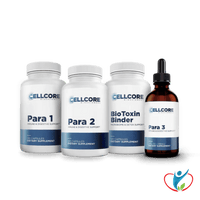Vitamin C is one of the most important micronutrients required for good health. Vitamin C, also called ascorbic acid, helps the immune system work correctly, is essential for the production of collagen, and is a powerful antioxidant. It’s also not a nutrient that our bodies can produce. We also can’t store it, so we must get it every day from food or supplementation.

Linus Pauling and Vitamin C
Our modern-day top-of-the-mind awareness of the benefits of vitamin C comes from the efforts of Linus Pauling, a brilliant biochemist who won a Nobel Prize for discovering the role of genetics in sickle cell anemia. In 1970, Dr. Pauling popularized the idea that large doses of vitamin C could be used as a cure-all for many conditions. However, the boom in vitamin C’s popularity led to its wider use and more research being conducted on its uses, which helped pinpoint conditions that vitamin C can alleviate.
What Does Vitamin C Do?
Vitamin C is a requirement for many vital processes in the body. Its absence leads to a host of ailments, some of which, like scurvy, can be serious. Let’s take a look at a few of the functions this vital and versatile micronutrient serves.
- Vitamin C is a highly effective antioxidant. During the processes by which our cells generate energy and metabolize nutrients, free radicals are formed. Free radicals are highly reactive substances that impair or damage cells. They’re also produced when the body is exposed to toxins, like those found in air pollution. Vitamin C helps stabilize free radicals, leaving them inert.
- Vitamin C increases the body’s ability to heal and regenerate damaged tissues, in part by reducing inflammation in the body and by helping produce collagen. Collagen is the most plentiful protein in the body and is used to heal tissue damage. It’s also used to give support to muscles, tendons, and bones. Collagen is a major component of the skin and allow skin to be supple and smooth.
- Vitamin C is also a contributor to the good health of oral tissues like the gums, tongue, and lining of the cheeks. These tissues regenerate new cells rapidly, which calls for a large, steady supply of ascorbic acid. In fact, all cells and tissues that need to heal or renew themselves rapidly rely on ample levels of vitamin C to work properly.
- Vitamin C fights inflammation. In part, this is due to vitamin C’s role as an antioxidant. Oxidative stress provokes moderate to severe inflammation throughout the body, which can be greatly reduced by maintaining high levels of vitamin C.
- Vitamin C in large doses can help smokers and those exposed to cigarette smoke excrete nicotine faster from their systems and assists detoxification from other environmental pollutants.
Vitamin C and Serious Illnesses
The immune system relies on vitamin C to work correctly. When we’re fighting an infectious disease, the immune system uses a great deal of Vitamin C to fight off invading germs. Vitamin C also augments the immune system by helping the body churn out billions of immune cells that hunt and kill bacteria and viruses. Human beings can’t store vitamin C over the long term, so we need a lot of it, especially when we’re fighting hard-to-beat infections.
Vitamin C has been found to be effective in reducing the duration and intensity of many infectious diseases, like the common cold, pneumonia, and many other respiratory diseases. There is also emerging evidence that megadoses of vitamin C may be useful in treating people hospitalized COVID-19.
Who Can Benefit from High-dose Vitamin C?
All adults can benefit from megadose vitamin C, especially in cold and flu season. Given that COVID-19 knows no season and is always out there, there’s never a bad time for vitamin C supplementation. Although you can get some vitamin C from your diet, there are formulations with superior bioavailability, including liposomal vitamin C and vitamin C IV drips. IV drip therapy is a quick, efficient way to get megadose vitamin C.
The Takeaway
Vitamin C is vital for your good health, especially when fighting illness. It’s an essential resource for the immune system, helping bolster it when fending off bacterial and viral infections, like colds, flu, and other respiratory infections.
Vitamin C supplementation can get more ascorbic acid to tissues needing it, faster and more efficiently than through food alone, and high-dose vitamin C has been found to be an effective add-on treatment for combatting the toxins resulting from smoking and second-hand smoke.
Works Cited
- Betteridge D. J. (2000). What is oxidative stress?. Metabolism: clinical and experimental, 49(2 Suppl 1), 3–8. https://doi.org/10.1016/s0026-0495(00)80077-3.
- Cagetti, M. G., Wolf, T. G., Tennert, C., Camoni, N., Lingström, P., & Campus, G. (2020). The Role of Vitamins in Oral Health. A Systematic Review and Meta-Analysis. International journal of environmental research and public health, 17(3), 938. https://doi.org/10.3390/ijerph17030938.
- Carr, A. C., & Maggini, S. (2017). Vitamin C and Immune Function. Nutrients, 9(11), 1211. https://doi.org/10.3390/nu9111211.
- Collagen. The Nutrition Source. (2021, May 27). Retrieved September 21, 2021, from https://www.hsph.harvard.edu/nutritionsource/collagen/.
- Dawson, E. B., Evans, D. R., Harris, W. A., & McGanity, W. J. (1999). The effect of ascorbic acid supplementation on the nicotine metabolism of smokers. Preventive Medicine, 29(6), 451–454. https://doi.org/10.1006/pmed.1999.0583.
- Hemilä H. (1997). Vitamin C supplementation and the common cold--was Linus Pauling right or wrong? International journal for vitamin and nutrition research. Journal international de vitaminologie et de nutrition, 67(5), 329–335.
- Wintergerst, E. S., Maggini, S., & Hornig, D. H. (2006). Immune-enhancing role of vitamin C and zinc and effect on clinical conditions. Annals of nutrition & metabolism, 50(2), 85–94. https://doi.org/10.1159/000090495.
- Villines, Z. (2017, July 29). Free radicals: How do they affect the body? Medical News Today. Retrieved September 21, 2021, from https://www.medicalnewstoday.com/articles/318652.












